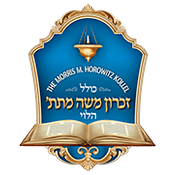Parshas Mishpatim 1


”ועבדתם את ד׳ אלוקיכם וברך את לחמך ואת מימך והסרתי מחלה מקרבך“ שמות כג;כה
“And you shall serve Hashem your G-d, and He will bless your bread and your water, and I will
remove sickness from your midst.” Shemos 23:25
This pasuk begs for interpretation as it begins in the plural form “And you (plural) shall serve Hashem” but curiously finishes off in the singular form when referring to “your (singular) bread and your water.”
The Rambam in הלכות תפלה, פרק א הלכה א learns that the “service” of Hashem mentioned in this pasuk is referring to the mitzvah of Tefillah (Prayer).
Therefore, as R’ Meir Soloveitchik z”tzl explains, the pasuk begins in the plural form as we are all commanded to pray. However, there are many different levels in the realm of prayer. For example, some pray with pure love for Hashem while others may pray only out of fear of Him. As such, the extent of the blessing that Hashem showers upon us as a result of our prayers will not be doled out equally, rather it is dependent on each individual’s level of Tefillah.
Hence the end of the pasuk, which refers to the bracha that abounds as a result of our prayers, is written in the singular form. Seeing as the amount of blessing received is contingent on each individual’s merit and devotion to prayer.
We learn from here an important lesson about the power of our individual prayers. Although we are all commanded to pray, the result of our individual prayers will differ greatly. It is up to us. What we put into it is what we will get out of it. The more we concentrate and disconnect from the distractions that surround us while davening to Hashem, the greater the bracha He will bestow upon us.
The Shulchan Aruch in סימן קצג סעיף ג talks about the prohibition of engaging in any other activities while one is saying Birchas Hamazon. The Mishna Berurah brings down that even a “ תשמיש קל ” (slight action) is prohibited. The Taz goes further to apply this din to Tefillah and all other Brachos as well, because it appears that one is making a blessing or davening by chance and without full concentration. Once again we are made aware of the importance of our actions with regards to Tefillah. Complete and total concentration is our goal. May Hashem reward us for our efforts.
Moshe Rothenberg / MMHK
